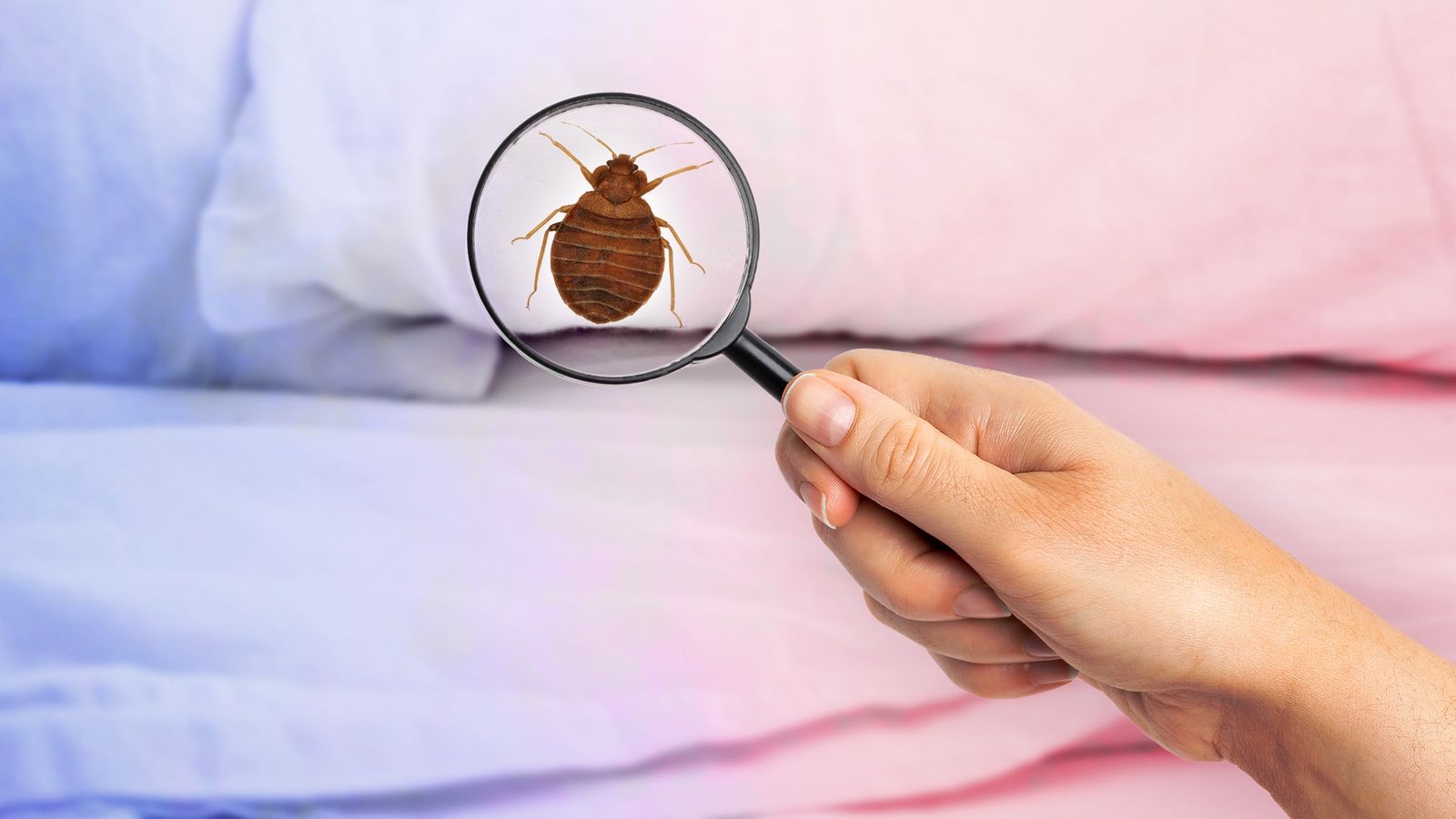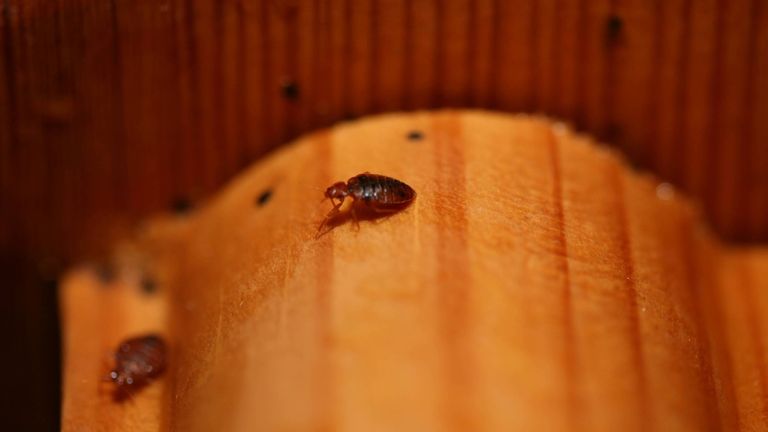Paris is grappling with a bed bug infestation – but the problem is likely just as bad in London, an expert says.
“They’re already on buses, trains, tubes, cinemas, doctor’s surgeries, public spaces, hospitals,” microbiologist and founder of Bed Bugs Ltd David Cain told Sky News.
The difference is that Parisians are talking about the problem, while Brits are “trying to keep the whole thing quiet”, he said.
That culture of silence, where people don’t know there is an issue and don’t know how to tackle it, creates the perfect environment for bed bugs to spread, he said.
So what’s happening in Paris and the UK, and how can you avoid picking up bed bugs – or deal with them if you do?
Here’s everything you need to know…
What’s happening in Paris?
Bed bugs aren’t a new problem in France’s capital – but things seem to have got worse recently.
They have been spotted in homes, cinemas, hospitals and trains, according to reports.
Emmanuel Gregoire, deputy mayor of Paris, described them as a “scourge” and a “public health problem” as he called on the prime minister to act.
The city has been waging war on the creatures for years. In 2020, the government launched a campaign to tackle the problem, setting up an emergency helpline where people could get expert advice.
More than one in 10 French households had a bedbug infestation between 2017 and 2022, according to a report from ANSES, the French health and safety agency.
How bad is the bed bug problem in the UK?
The UK saw a 65% increase in bed bug infestations from 2022 to 2023, according to data released by pest-control company Rentokil in September.
Reacting to the findings, Natalie Bungay from the British Pest Control Association (BPCA) said she wasn’t surprised.
“Reports of bed bug activity tend to increase in the summer as people travel more.
“The lack of travel during COVID-19 lockdowns meant bed bug issues were few and far between, so it’s not surprising we’re now seeing a rapid rise in call outs.”
Mr Cain estimated 5% of households in London have had a bed bug infestation in the last two years.
People who haven’t been on holiday for years are finding the bugs at home, he said, so it’s not as simple as people travelling and bringing them back.
People who don’t have cars are also facing the problem, indicating they are embedded on public transport networks, he said.
The increase in recent years is part of a decades-long trend. Bed bugs were common before the Second World War, but the discovery of DDT as a cheap and effective insecticide helped control them.
But the insects developed resistance to DDT, and then to the next wave of insecticides.
Could bed bugs travel from Paris to the UK?
Bed bugs are known for hitching rides when people stay at hotels with infestations, and can survive a plane or Eurostar journey back to the UK.
Eurostar said it was on alert and ready to step up “preventive treatment” across the network.
A spokesperson told Sky News finding insects such as bed bugs on trains was “extremely rare”.
“The textile surfaces on all of our trains are cleaned thoroughly on a regular basis and this involves hot-water injection and extraction cleaning, which has proven highly effective in eliminating bugs.”
Trains will be disinfected “on request or as soon as there is the slightest doubt” if there is a report on a hygiene matter, they added.
Mr Cain said the treatment frequency would need to be “one journey, one clean” to really tackle the problem.
“Otherwise you’re using the same train to go backwards and forwards – and every time a new set of customers get on, then they potentially pick up the problems left by the previous one.”
But he reiterated his message: infestations in the UK will not just be down to bed bugs crossing the Channel, because “they are already here”.
What should you do to prevent an infestation?
Regularly checking your mattress, cleaning the frame of the bed and vacuuming around it will mean any bed bugs can be found and dealt with quickly.
Mr Cain also advised installing a beg bug monitor on your mattress which will show if any bed bugs have crossed its path.
Mr Cain said: “If you don’t get into that disciplined practice of checking once a month, there will come a day when you tip your mattress up and there’s going to be maybe 5,000 or 6,000 bed bugs looking back at you.
“Once they’ve been in your property for more than about 60 days, the population is doubling every 14 days.”
If you spot bed bugs, what should you do?
The most important thing is not to panic, Mr Cain said, because you are more likely to make mistakes in a heightened state of anxiety.
He listed three common mistakes to avoid: don’t use an aerosol-based insecticide, don’t use a fogger for bed bugs and don’t throw away furniture because you could introduce the bugs to any new furniture.
If you’ve caught the problem early, it may be possible to eradicate it by washing bedding and clothes on a hot wash and vacuuming the affected room.
But DIY solutions involve a big time investment to research and do them right, he said – and there’s no point only getting rid of 90% of the bugs because you’ve still got an infestation.
The NHS advises calling a pest control company or your local council. If you rent, it’s the responsibility of your landlord, local council or housing association to deal with the infestation if it predated your tenancy.
How do you spot bed bugs?
Bed bugs tend to hide in bed frames, mattresses, clothing and furniture, and mostly come out at night to feed on sleeping humans.
Your first sign of bed bugs might be bites, which can be raised and itchy and are often in a line.
Bed bugs are not known to carry disease, but the bites can be uncomfortable and the psychological toll of an infestation can be distressing.
Not everyone will react to the bites, so you might be sharing a bed with the bugs without noticing.
Other telltale signs include spots of blood on bedding, either from the bites or from squashing a bed bug that’s recently fed, or brown spots on bedding or furniture from bed bug faeces.
Confirmation of bed bugs involves either seeing the creatures, their shed skins, or testing the faeces spots.
Adult bed bugs are about 5mm long and look a bit like an apple pip. The eggs are about 1mm long and pearly white – they may be found on their own or in clusters.
Read more on Sky News:
Why Welsh young people are moving away in droves
Tupac’s brother says killing remained unsolved due to race
How can you avoid bed bugs while travelling?
If you’re staying in a hotel or apartment, check your bed for bugs, looking in the seams of the mattress and cracks of the headboard.
Avoid putting your suitcase under the bed and keep it zipped as much as possible – just take clothes out as you wear them and don’t leave them on the floor.
Keep your suitcase elevated on a hard surface if possible. When you’re packing for a trip, put clothes into resealable plastic bags and use a hard-shelled case if you have one.
How can you ease the itch of bites?
The NHS recommends putting something cool on the infected area, trying not to scratch to avoid infection and keeping the area clean.
If your bites are very itchy or painful, a pharmacist may be able to recommend a steroid cream or antihistamine.
Will France’s bed bug problem be solved by next summer’s Olympics?
France is holding crisis meetings about bed bugs in the first week of October – less than 10 months before the Paris 2024 Olympics open.
On 3 October, the French government said a cross-party bill would be put forward in December to combat the “scourge” of bed bugs.
The head of Emmanuel Macron’s Renaissance party in the French National Assembly, Sylvain Maillard, said the president’s party and its allies had decided to make the subject a “priority”, Le Monde reported.
But there is an “incredibly narrow window” for authorities to get the problem under control, Mr Cain said.
The solution would lie in “getting ahead of the infestation site” by installing monitors and making sure rigorous screening programmes are in place across the city’s accommodation, transport network and the Olympic Village.
“To be honest, I don’t think Paris has enough time now,” he said.



